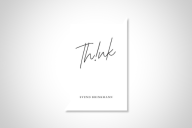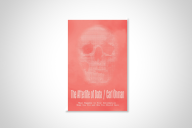You have /5 articles left.
Sign up for a free account or log in.
When Winston Smith discovers the blind spot in his apartment -- the niche just out of range of the telescreen, Big Brother’s combination video feed and surveillance system -- it is, George Orwell tells us, “partly the unusual geography of the room” that allows him to take the risk of writing in a diary.
Later Smith finds another room with no telescreen at all, where he and Julia create another zone of privacy: the shared kind, intimacy. It can’t last, of course, and it doesn’t, with brutal consequences for both of them. (Thoughtcrime does not pay.)
The dystopia of Orwell’s 1984 is very much the product of its era, which spanned roughly the period between Hitler’s ascension to power in 1933 and Stalin’s death 20 years later. And while the novel’s depiction of a world without privacy can still raise a reader’s hackles, its technology now looks both retrofuturist and surprisingly inefficient. The telescreens are menacing, but there’s always a chance that Big Brother’s watchers will overlook something. And look at the tools that Winston uses to carve out his own domain of personal memory and antitotalitarian sentiment: a pen and paper. The authorities manage to read his thoughts eventually, but it takes most of the novel to get to that point. Today, Winston would be destined to Room 101 before he powered down his notebook.
Last week, I noted that Meg Leta Jones’s book Ctrl+Z: The Right to Be Forgotten (NYU Press) arrives at a time when ever fewer activities or communicative exchanges occur without the accompaniment of some form of information technology intervening. Digital traces generated along the way are gathered, analyzed, sold. And the right to privacy becomes a little more purely notional each time one’s eyes slide down the text of a user agreement on the way to clicking “accept.”
A kind of fatalism is involved, one resting on the tacit but powerful tendency to assume that technology itself defines what information will gathered, and how, and the use to be made of it. Implied is a trade-off between privacy and various benefits -- with both the cost and the reward determined by what our devices do and require. Privacy is, in this view, a function of engineering necessities, not of political or moral decisions.
The initial, blunt challenge to technological determinism comes in Ctrl+Z’s opening chapters, where Jones, an assistant professor of communications, culture and technology at Georgetown University, contrasts how the European Union and the United States frame their policies concerning the availability of personal information online. Here personal information would include employment history, financial data and arrest records, as well as, say, material communicated via social media.
In the United States, she writes, the default attitude “permits the collection and transfer of personal information and prevents abuse through self-regulation and market forces,” while E.U. states “operate under comprehensive regimes that protect information across both the public and private sectors and are enforced by specialized data-protection agencies.”
The contrast becomes striking when “data protection” might be better described as protecting the reputation or well-being of the individual to which the data pertains. Take the case of someone who, as a young adult, is arrested for vandalism and destruction of property and serves a jail sentence, all of which was written up in a newspaper in 1990 as well as being documented in official records. Once released, he swears off his old ways and spends the next 25 years in steady employment and overall irreproachable conduct. He awakes to find that the newspaper has digitized its archives and made them searchable via Google.
If our reformed graffiti artist lives in America, he can do little if anything about it, apart from asking the paper to take down its accurate but deeply embarrassing article. There is also a chance his conviction will be publicized on any of various websites dedicated to posting mug shots.
In a number of E.U. countries, by contrast, he could appeal to laws that forbid public reference to someone’s criminal record if it is no longer news or if the ex-con has undergone significant rehabilitation. He might also file a request with Google to remove links to sites mentioning the old transgression. In 2014, the Court of Justice of the European Union ruled that the search engine had to establish a take-down system for people who wanted personal information removed from its search results.
There are variations from country to country, but Jones finds that the E.U. “data subject” (in effect, the citizen’s digital doppelgänger) can claim a “general right to personality” -- a certain degree of dignified immunity from unwelcome attention. The American data subject, by contrast, is presumed to take the Wild West ethos of the Internet pretty much as a given, with any effort to delete information or limit its circulation being labeled, almost inevitably, as Orwellian. (Even so, a number of piecemeal efforts have been made in the United States to protect children and victims of harassment and bullying, including laws against revenge porn.)
But as Jones goes on to show, any preference for one of these frameworks over the other will soon enough be faced with the much harder matter of dealing with new and unanticipated shades of gray left out of the public/private distinction. And the other dichotomy -- between having every bit of personal data (flattering, humiliating or neither) either preserved forever in a digital archive or destined for the memory hole -- is also looking out of date. Jones’s book doesn’t predict what comes next, but it’s a great stimulant for anyone bracing themselves to think about it.








